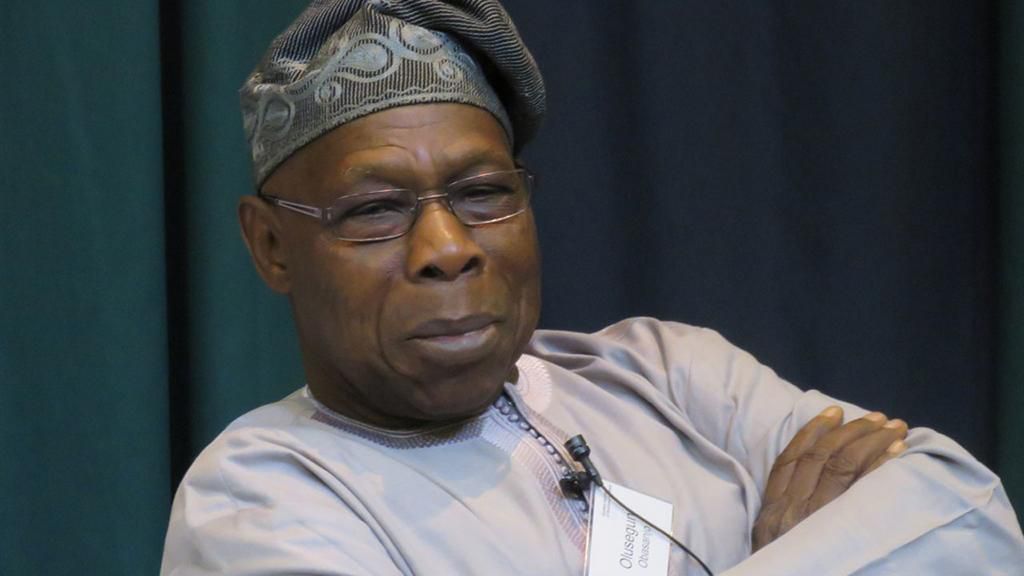Obasanjo raises alarm over impending bankruptcy, says Nigeria is sinking
)
Obasanjo says as at March 2019, Nigeria's external debt had increased to $81.274bn.
Former President, Olusegun Obasanjo has decried the rate at which the Federal Government of Nigeria continues to take loans for projects, saying the country is sinking under the weight of debt.
Obasanjo said things might get worse for Nigeria because the country needs 50% of its foreign earning to service the debts.
The former president said he’s worried for the future generation, who will have to the loans.
Obasanjo said this on Friday, December 27, 2019, at an event in Lagos, where he presented a paper titled ‘Nigeria: The Challenges of Debt and Sustenance of Democracy.’
According to him, Nigeria’s total external debt as at 2015 was about $10.32bn.
He said that by March 2019, the country’s external debt had increased to $81.274bn, adding that Nigeria needs at least 50 per cent of its foreign earnings to service such level of indebtedness.
“Such a situation talks about an impending bankruptcy. No entity can survive while devoting 50 per cent of its revenue to debt servicing”, Obasanjo warned.

“It has recently been pointed out that in 2018 that total debt servicing took over 60 per cent of government revenue. What’s more, we are not doing enough to address the fundamental, deep-seated and structural challenges that inhibit the expansion of our economy”.
The ex-president went on to criticize Nigeria’s political leaders, saying they have developed appetite for debt.
“Our political leaders have suddenly developed not just a taste for, but a voracious appetite for debt.
“As usual, most of such debts procured are hardly thought through.
“Predictably, ability to repay such debts is lacking.
“Unfortunately for us and unlike in the past, the new creditors are less tolerant of our limitations and inadequacies and are now demanding to manage institutions and agencies with a view to recouping their loans.”
Obasanjo, who served as a democratic President of Nigeria between 1999 and 2007, warned that “Using debt to finance growth and/or development is a double-edged sword that must be wielded with a high degree of discipline, responsibility and foresight.
“A well-calibrated debt for infrastructure and other developmental goals could be very positive. However, we do not need to speculate. We need to examine our historical experience.”
He, however, maintained that the Federal Government worsened the matter by seeking to add another $29.6bn loan to “our already overburdened debt portfolio.”
Recall that President Muhammadu Buhari recently submitted a loan request of $29.6bn to the National Assembly for infrastructural development.
Despite the criticism against the move by economic experts, there are indications that the Senate and the House of Representatives would approve Buhari’s loan proposal.
The Senate President, Dr Ahmad Lawan, and the Speaker of the House of Representatives, Mr Femi Gbajabiamila, have been accused of overseeing a rubber-stamp legislature for approving Buhari’s requests.
)
![Aisha blows hot on Security forces; Y7ou won't believe what she said [VIDEO]](https://image.api.sportal365.com/process/smp-images-production/pulse.ng/17082024/1f976edf-1ee2-4644-8ba1-7b52359e1a8f?operations=autocrop(640:427))
)
)
)
![Lagos state Governor, Babajide Sanwo-Olu visited the Infectious Disease Hospital in Yaba where the Coronavirus index patient is being managed. [Twitter/@jidesanwoolu]](https://image.api.sportal365.com/process/smp-images-production/pulse.ng/16082024/377b73a6-190e-4c77-b687-ca4cb1ee7489?operations=autocrop(236:157))
)
)
)
)
)
)
)
)
)
)
)